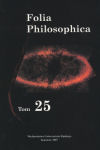Kant i Husserl a problem ontologizacji i deformalizacji "a priori"
Kant und Husserl und das Problem der Ontologisierung und Deformalisierung des Apriori
Author(s): Piotr ŁaciakSubject(s): Philosophy
Published by: Wydawnictwo Uniwersytetu Śląskiego
Keywords: Kant; Husserl; a priori; ontology
Summary/Abstract: The article presents two conceptions of "a priori" cognition, i.e. that of Kant and Husserl. Kant’s and Husserl’s positions differ as to the basis of importance of "a priori". Kant conducts subjectivisation of "a priori" because, in his opinion, a priori criteria, such as generalization and necessity, have their basis in the recognising object, and, at the same time, express a subjective inability to present them in other way. Husserl, on the other hand, ontologises "a priori", saying that aprioriness is grounded in the essence, and, as such, expresses an objective deriving from the essence’s inability to be in a different way. However, a consequence of a phenomenological ontologization of "a priori" is a discovery of a material "a priori". The aritcle shows that it is possible to see an analogy between Kant’s and Husserl’s standpoints in terms of the scope of aprioriness. Kant’s subjectivisation of "a priori", though, does not imply a total formalization of what is a priori because Kant is a creator of an idea of an un-clear synthetic "a priori", where one can find similarities to Husserl’s material "a priori".
Journal: Folia Philosophica
- Issue Year: 2007
- Issue No: 25
- Page Range: 106-127
- Page Count: 22
- Language: Polish

